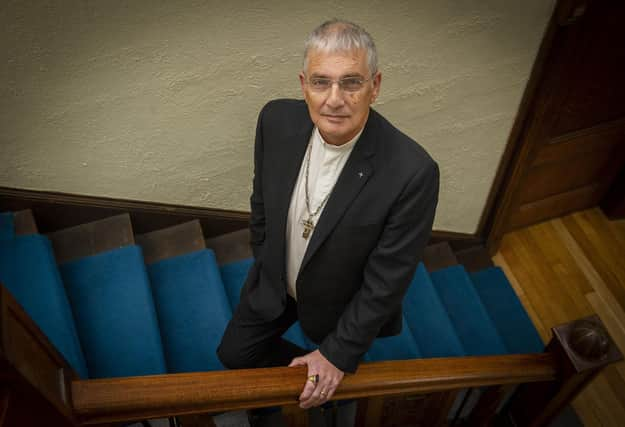Opinion: Is this really what a caring society in Scotland means? Moderator explains Kirk opposition to assisted dying


My experience, in common with many others in church congregations and communities throughout Scotland, has often involved the privilege of coming alongside people who are vulnerable, to provide support for those experiencing trauma, and to walk with people through the realities of illness and death.
The Church has extensive experience in caring, particularly for those at the end of their lives. While reaffirming the importance of caring for those approaching the end of their lives and supporting the provision of better palliative care, the Church of Scotland has consistently and
Advertisement
Hide AdAdvertisement
Hide Adrepeatedly opposed any change in the current law, which prohibits assisted dying in all its forms (including assisted suicide, physician-assisted suicide and euthanasia).
Our opposition is based on our Christian faith and includes concerns around the principle of assisted dying, around the application of the law in practice, the perception value of human lives, and also the effect this change is likely to have on the provision of care - especially palliative care.
The current societal prohibition on killing is clear; to move away from this would not be a simple modification of the law, but would represent a significant shift from which there would be no return. This would have profound effects on how society regards those in our communities who are vulnerable. This does not just affect the elderly and infirm, but also those with disabilities, and those who are unable to speak up to protect themselves. Is this really what a caring society in Scotland means?
In jurisdictions where assisted dying has been allowed, the experience of framing and maintaining safeguards has been fraught with difficulties, and frequently subject to removal or relaxation of restrictions to eligibility. In Canada, the law from 2016 was amended in 2021 to remove
the requirement for terminal illness, and there is currently debate to extend eligibility even further.
Similar patterns can be noted in the Netherlands. The law, passed in 2002, has contributed to a normalization of physician-assisted dying and has inevitably led to an expansion of its practice.
Astonishingly, among doctors who acknowledged failing to report assisting a patient to die, 18 per cent stated that they did not do so because reporting was “too much of an administrative burden”! Is this really the kind of attitude we seek to foster among those who care in Scotland?
The acceptance by society of legally assisted dying profoundly changes relationships not only between health professionals and patients, but also within families. We are concerned that, should assisted dying be legalised, the way our society views older people and those with disabilities will, over time, become more utilitarian. The lives of those on the margins of society will inevitably come to be seen as less valuable or even burdensome. Is this really the kind of society we aspire to?
Advertisement
Hide AdAdvertisement
Hide AdWe have concerns about the potential effect that this legislation may have on provision of palliative care. We would advocate for more and better palliative care; evidence from other jurisdictions suggests that allowing assisted dying has a negative effect on the
importance placed on palliative care. In Canada, for example, participants in a research study reported that Medical Assistance in Dying (the term used in Canada) had consumed resources that would otherwise be used to provide palliative care. Is this really the way we wish to see precious caring resources directed?
Given the pressure on healthcare resources, we are also very concerned that assisted dying could be seen as providing an opportunity for cost-saving. An analysis from Canada, referred to in the consultation document for the legislation shorty to be considered by the Scottish Parliament, states that a 2017 cost analysis of assisted dying concluded that: “Medical assistance in dying could reduce annual health care spending across Canada by between $34.7 million and $138.8 million”
There is considerable confusion in the general public about the what the term “assisted dying” means. In one survey, fewer than half (43 per cent) of those interviewed correctly identified that the legal term “assisted dying” means providing people with lethal drugs to end their life.
Many respondents thought it means hospice, palliative and other forms of supportive care at the end of life, or giving terminally ill people the option of ending life-prolonging treatment.
We are concerned about this confusion.
It must be made clear what the proposed “Assisted Dying” Bill is about, to allow a better and more informed public debate about important and sensitive issues.
We believe that, were assisted dying to be introduced in Scotland, the relationship between those cared for and those who have the duty to care (including family, health and social care professionals, but also society in general) would be irredeemably altered. The end of a person’s life involves not simply the moment of their death, but also how they experience their final days and weeks. A good death does not need to be one which is hastened.
While many who advocate assisted dying point to the principle of autonomy and argue that one should have freedom to choose the timing and manner of one’s own death, we urge everyone to remember that all of our actions have effects on others and that life is lived and death experienced as part of community and society.
Advertisement
Hide AdAdvertisement
Hide AdIn conclusion, the Church of Scotland, while respecting the sincerity of those promoting change, supports the existing law and protections around the end of life, and is opposed to a change to allow legally assisted suicide, or any other form of assisted dying.